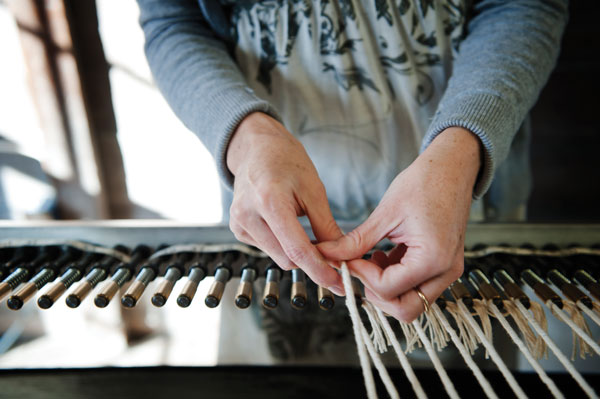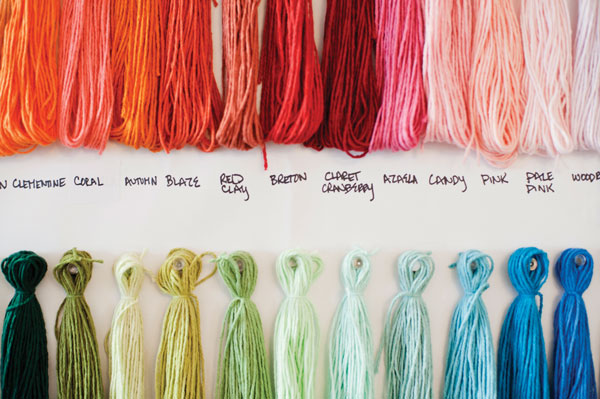One Step Back, Two Steps Forward
PROFILE-March 2011
by Will Bleakley
Photography Nicole Wolf
An industry central to Maine’s economy—textiles—fell on hard times and nearly became extinct. David Kaufman, new owner and president of Brahms Mount, shows how recalling the past can be forward thinking.
Entering the textile mill of Brahms Mount in Hallowell feels like stepping into one of those black-and-white propaganda films from the industrial revolution. “Textiles! The ENGINE of the 20th CENTURY!” a voice booms as the words appear on the screen while good old-fashioned American workers operate steel machinery. Here in Hallowell, the sounds of antique shuttle looms reverberate down Central Street, giving the illusion that the rustic barns are producing something far more menacing than an alpaca-cotton throw. The noises, nonetheless, are comforting. While a shroud of secrecy surrounds most items we consume today, Brahms Mount showcases its process.
Everything in the mill is always moving, either side to side or up and down. Boxes slowly descend from the second floor, and shuttles on looms zoom the ten feet back and forth within the blink of an eye. The threads within are unpacked onto spools as each one is hand-tied and sent to the master weaver, who operates the antique shuttle looms. Slowly but surely, a blanket, that will eventually be handled fifty times, can be seen emerging from this process. While initially this scene may transport one to a different time, the sounds of Metallica trying to be heard over the machines, and the dreadlocks of the master weaver bouncing to one of the many rhythms, are a reminder this is 2011.
David Kaufman didn’t purchase the nearly thirty-year-old company in 2009 for it to serve as a relic, as a joyful reminder of past American industrial dominance. He is out to prove that this transparency provides reassurance and fosters a deeper connection between the customer and the product. That this is a business model that others in the state, and the textile industry, can rally around.
“I like to build things,” David Kaufman says, struggling to be heard over one of the last operational textile mills in the United States. “That’s what I do, and I can’t help myself.” Kaufman knew next to nothing about textiles when he acquired the company, but he’s psyched. As he bounds from room to room, talking fiber constructions and European linen with people who have devoted their lives to the craft, it’s easy to see he’s exactly the injection of energy that this historically rich but endangered Maine industry needs.
Textiles were central to the prosperity of towns along the Androscoggin River throughout nineteenth and early twentieth centuries, but as Maine transitioned from an industrial state to a vacationland in the 1950s, factories left, first to go south, then overseas. In 1965 95 percent of all apparel and textiles were manufactured in the United States. Now, it’s less than 2 percent. However, in 1983 Claudia Brahms and Noel Mount purchased a ramshackle barn in Hallowell, outfitted it with antique looms, and built a small but sustainable company around heirloom linen and cotton blankets, expertly crafted and impeccably designed. They knew then, as Kaufman does now, that the warmth and comfort from a blanket is a reflection not simply of the material but also of the process it took to make it.
Before Claudia Brahms and Noel Mount sold their company they worked, slept, and ate within their business headquarters for twenty-six years. Kaufman has since converted their bedroom into his office, their living room into a center for research and design, and the kitchen into a showcase for trade shows. “It’s a perfect marriage,” says Kaufman. “Claudia and Noel are very accomplished textile artists, but they weren’t focused on marketing like I am.” Claudia still operates as lead designer, and Noel adds manufacturing expertise as needed, while Kaufman is taking the blankets, enveloping new markets and customers in them, and bringing the company to a whole new level of visibility. Kaufman is reviving an industry that in most places had been left for dead, surviving only in a tiny pocket of central Maine. He’s a leading example of how a niche mom-and-pop operation can team with an energetic, business-savvy mind in a way that lets both creativity and profits expand.
Kaufman grew up forty-five minutes outside New York City in Harrison during the 1950s. His father was tragically killed before he turned ten, and his grandfather sent him to summer camp in Maine to distract him from the loss. He stayed in the northeast throughout his early life—attending Boston University then working the midnight shift at CBS Network News. When he was offered a reassignment to Vietnam during the war, he declined and left the station. “I admire news a great deal,” Kaufman says, “but it was too huge a commitment.” He worked for television sales organizations based in New York and Chicago but realized he needed to be his own manager. “I just don’t like corporate,” Kaufman says, “So I scrambled to raise money and bought a radio station in Maine.”
He wanted to own a broadcast property, and with a business partner, he found the only ones he could afford—one in Missoula, Montana, and another in Skowhegan, Maine. “I said to my partner, ‘We’ll go to Maine. It’s near the coast, and we can sail.’ That’s what got me to the state, and I’ve been here ever since.”
Kaufman built a group of radio stations, first owning rock station WTOS, then WCLZ, which Kaufman and his partner rebranded as an eclectic station with a bent toward jazz. He sold these properties in 1985 and began working for WMTW, Channel 8 television, in Portland. He held a number of management positions at the station, culminating with general management oversight of the family’s broadcast holdings in 1995. “The family decided to sell their TV and radio properties in 2005. I oversaw the transaction, and sold it on their behalf,” Kaufman says. “So that was it for me in broadcasting. I was retired, and I was enjoying myself.”
However, just over a year into retirement, Kaufman lost his daughter. “It was a day short of her twenty-third birthday,” he says. His otherwise lengthy responses grow noticeably shorter before reaching this point in his timeline. “Dara was living with us at the time in Maine. Her older brother, Aaron, was on the West Coast, and it was tragic beyond words. She was camping with some friends and a tree fell on her. And that changed everything.”
Kaufman struggled in the first few years following her death. “I recognized that I needed to do something, get busy again,” he says, “I thought I’d try and see if I could find a small company. I looked for about four years, and then Brahms Mount, this little gem, came across my desk in January of 2009.”
Despite spending decades in Maine, Kaufman had never heard of the company. This is what got him excited. “I didn’t know anything about it, but I fell in love with the products, connected with Claudia and Noel, and felt this enormous opportunity to show it off to the world,” he says. Those close to Kaufman have questioned the logic of investing so heavily in an industry that is increasingly shipping overseas, and he can’t entirely rationalize it either: “I just became enthralled with creating a beautiful tangible product, and I was at a point in my life where it just fit. It was an emotional connection I can’t explain. There’s just something very comforting about surrounding yourself with all these products.”
Both Claudia and Noel agreed to stay with the company creatively but wanted to let go of the business side of the operation. “Not that they weren’t good business people—they had a successful business for twenty-six years—but it wasn’t their primary driver. They really got more excited about creating a beautiful piece of fabric,” Kaufman says. “Me, I get jacked up when I close business. I get a kick out of it because I feel like I’m spreading good work.”
Although the company has always been successful, according to Kaufman, he wasn’t looking to retain the status quo. “I didn’t buy the company to sit with it,” he says, “I saw it as an amazing foundation to build off of. So I focused on branding and marketing to reposition the company.”
Since April of 2009 Kaufman has quadrupled the company’s revenue through a combination of aggressive marketing and an expansion of creativity through the addition of new fibers and products. Through heavy capital investments Claudia and her team of expert designers and craftspeople have a significantly larger creative palette to choose from. For twenty-six years Brahms Mount focused on linen and cotton blankets and throws. Since Kaufman has taken over, the line includes scarves, pillows, towels, and shams, available in cotton, linen, wool, alpaca, and a variety of blends, all in colors formerly unavailable. “Instead of thinking ‘Oh, it’s just a blanket company,’ we can be more than that. We can fill up a room,” he says.
The company is now featured in major trade shows throughout the United States, and is looking to be represented internationally, all while promoting its Maine roots. “Maine’s got a great brand,” Kaufman says. “There’s something about the state. I think there’s a lack of visual clutter here, so you can stay focused and do things in a very authentic, clean way.” There is still resonance with the public for an expertly crafted, American-made product, but Kaufman doesn’t need to say that. One just needs to experience it.
“Feel this!” he says excitedly, as I grab the corner of a newly made product between my thumb and pointer finger. Next thing I know, I’m enveloped in a linen blanket. “Isn’t that gorgeous? Isn’t that great!?” He’s giddy just watching me react to the product. “I don’t have to sell it. I just say ‘wrap yourself in that.’” When encased in these finely crafted items, Kaufman doesn’t want one to feel just the texture. He wants you to feel the love of the many sets of hands that have overseen its making. He wants you to imagine everything from yourself as a child, wrapped in this blanket with a pacifier, to sharing it with your spouse by the fire in old age. He wants Brahms Mount to provide the same comfort and relief for you as it did for him.









